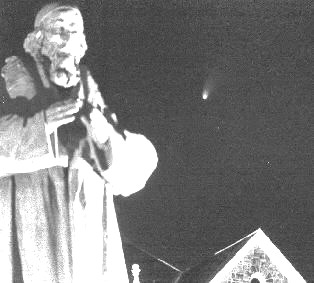Science Education
Comet Hale-Bopp by the statue of John Amos
Comenius,
a pioneer of Modern Education.

(photograph by J. Gerencher)
I retired from the Moravian College faculty in 2009, so the pages below may not describe the current teacher education programs. Please see the Education Department web site for the current program and course descriptions.
The descriptions below reference only the courses that I taught within the teacher education program, and are applicable only to the spring of 2009 and prior years.
I taught Education
228: Science in the Elementary School.
Click here for a link to the Ed 228 learning center page.
Click here for a link to the Ed 228 media page.
Click here for a link to external
sites for science lesson plans.
Click here for a links to local,
state, and national Departments of Education.
Click here for external
link to the Pennsylvania Science Education Standards.
Click here for external
link to the National Science
Education Standards.
I was the advisor to both the elementary and secondary general science programs and, in cooperation with some of my science colleagues, coordinated the other secondary science education programs. Through the spring of 2009, Moravian College offered teacher certification in the following science areas:
Secondary Sciences:
Biology
Chemistry
General Science / Secondary Education
Physics -- two alternative certification tracks:
Physics Major Option
Physics / Math (Set I / Set II) Option
Elementary Education:
General Science / Elementary Education
Until 2002, I taught Education 378: Science in the Secondary Schools. This is the seminar course for teaching the sciences in the secondary schools and was taken simultaneously with the student teaching experience. Until 2002, I was the science faculty member who observed and evaluated all secondary science student teachers.
In 1999, I developed a half- course, IDIS 390.2: Writing in Science Education, to fulfill the writing-intensive LinC requirement of the College for all majors in General Science Education from both the elementary and secondary programs. I taught this course from then until my retirement in 2009. The link above provides the syllabus for the course.
Secondary Science Education (current only to the summer of 2009)
The secondary teacher education programs for Biology and Chemistry required the students to
take the full major in Biology or Chemistry, respectively, and to take the Education
courses, including student teaching, as the electives. The secondary teacher
education program in Physics provided two options: the one option was similar to the
Biology and Chemistry programs because it required the full Physics major with the
electives in Education courses, whereas the other option required six specific courses in
Physics and an additional six in Math, with the electives taken in Education courses.
The secondary teacher education program in General Science required, in addition to
the Education courses, a set of specific science and math courses which insured the study
of the breadth of sciences, including biology, chemistry, physics, and the earth sciences,
and the program required additional course work at the upper levels in one science field
of the student's choice.
Elementary Science Education (current only to the summer of 2009)
The elementary teacher education program allows students to major in General Science.
For the Elementary Education General Science program, students are required to take
nine science courses representing at least one course from each of the four science
fields: biology, chemistry, earth sciences, and physics. In addition there are
certain math courses required, as well as the appropriate courses in elementary education.
All students in the elementary education program were required to take the Education 228 course, and all students in the secondary education science programs were required to take the course Ed 361: Curriculum and Instruction in the Secondary Science. During the student teaching semester, secondary education science students took EDUC 378: Seminar in Student Teaching.
Click here for safety issues for science education at both the elementary and secondary levels.
The collection of science education videos was maintained at the Moravian College Library.
During the Spring semester of 2003, I had the privilege of participating with the Full Option Science System (FOSS) development team at the Lawrence Hall of Science, University of California at Berkeley. I wrote a description of the experience, entitled "A Hands-On Sabbatical Experience with the FOSS Development Team," that was published in the Fall, 2004, FOSS Newsletter.